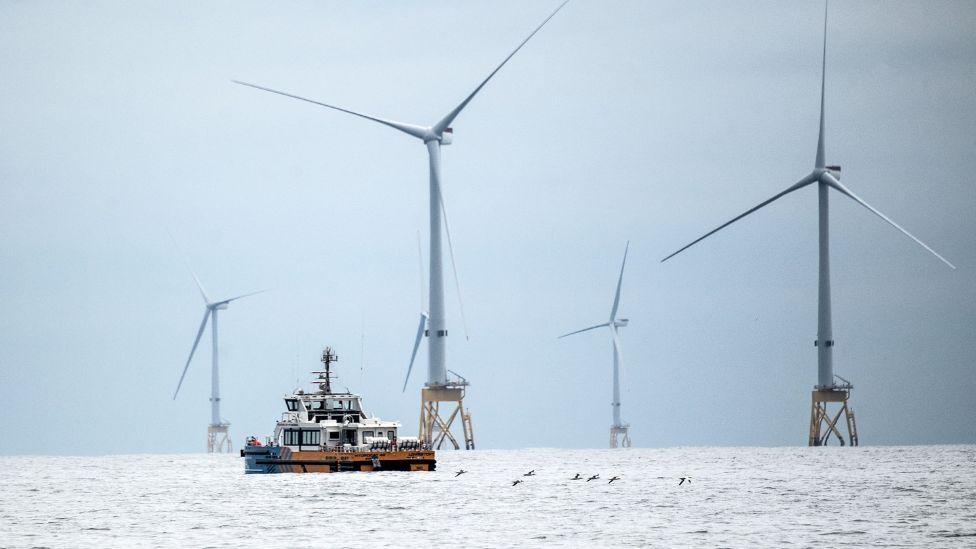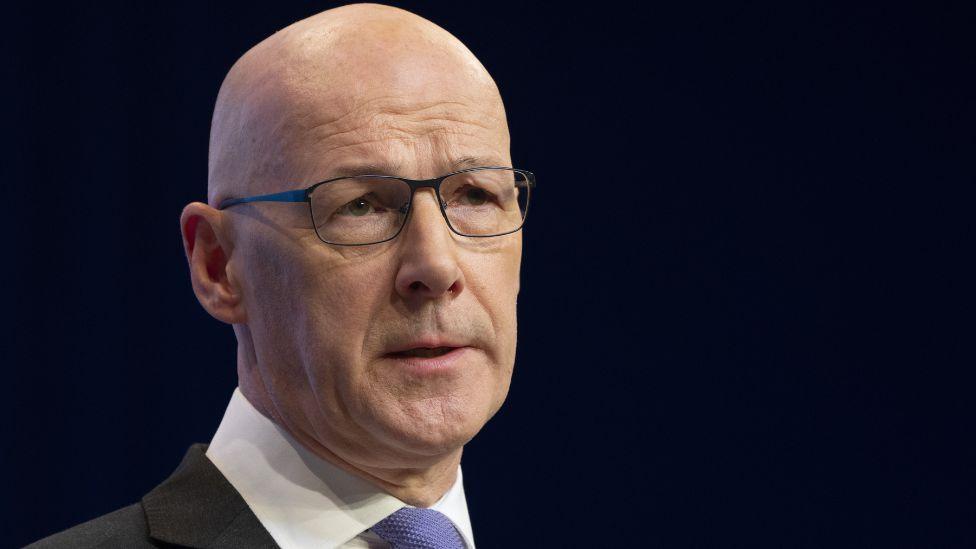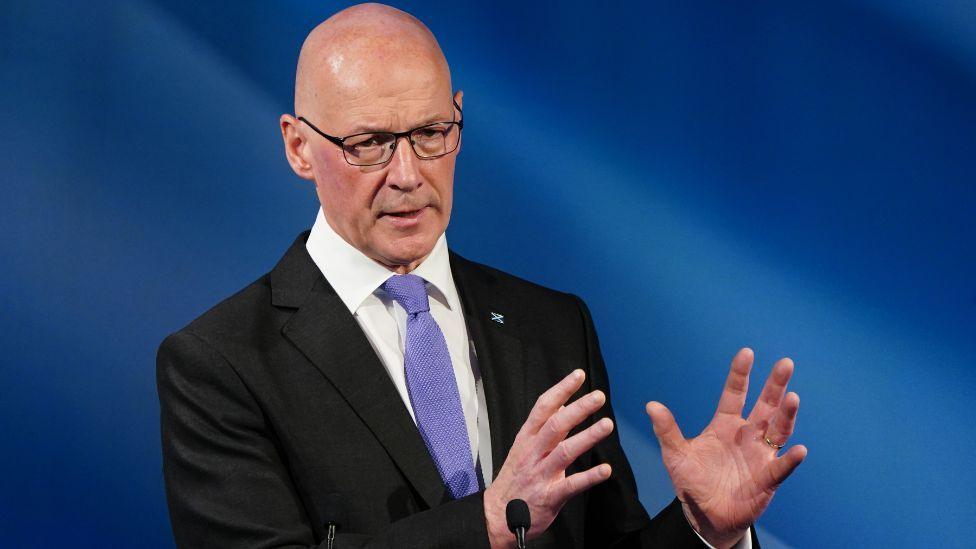Scottish government confirms £500m in cuts
Finance Secretary Shona Robison has announced more than £900m of measures to balance the budget
- Published
Scotland's Finance Secretary Shona Robison has announced up to £500m of cuts to balance the government's budget.
Ms Robison told parliament the country was facing "enormous and growing" financial pressure, including additional costs of £800m in this financial year.
She cited public sector pay deals, "prolonged" Westminster austerity, inflation, the pandemic and the war in Ukraine.
As well as direct cuts, including to mental health services, the government will reallocate up to £460m raised in an auction of seabed plots for offshore projects - cash that was previously earmarked to tackle the climate crisis.
The finance secretary, who announced a total of £933m in measures to balance the budget, told parliament: "We cannot ignore the severe financial challenges we face.
"We will continue to be a fiscally responsible government and balance the budget each year - as we have done every year for 17 years and we will do again this year.
“But this will mean we must unfortunately take difficult decisions along the way.”
Opposition figures pointed to a Scottish Fiscal Commission report that found much of the financial pressure on the public purse “comes from the Scottish government’s own decisions”.
Ms Robison told MSPs £188m would be cut across government departments – including a reduction in spend on sustainable and active travel, and increased interest income on Scottish Water loan balances.
In the annex of a letter from Ms Robison to the finance committee, external, it was revealed that £116m of the cuts will come from the health budget, including an £18.8m reduction in mental health services.
Outlay on transport is to be cut by £23.7m, while net zero and energy spending is reduced by £23.4m, with social justice down by £15.7m.
The Scottish government introduced emergency curbs on all "non-essential" spending last month, including a recruitment freeze.
It said cost-cutting measures were necessary amid pay negotiations involving council workers, doctors, train drivers, nurses and teachers.
Ministers had already announced they would implement means-tested winter fuel payments, reintroduce peak rail fares, scrap free bus travel for people in the asylum system and delay a digital devices programme.
Spending controls and cuts
In addition to these measures, Ms Robison vowed the government would “maximise efficiencies” in public bodies.
She said she would look to extend a recruitment freeze to public bodies, while "ensuring that frontline services in the like of our NHS, police and fire can recruit the staff they need".
The finance secretary also signalled cuts in the public sector workforce, noting that it was larger relative to other UK nations and telling MSPs it would need to “evolve”.
Ms Robison said up to £60m will be saved through emergency spending controls imposed on government departments, particularly those relating to recruitment, overtime, travel and marketing.
A further £65m is to be saved by reintroducing peak rail fares, axing concessionary travel for asylum seekers and allowing local authorities to finance pay deals by drawing on funds from existing programmes - such as flood defences and providing digital devices for children.
The government will also divert £160m previously earmarked for winter fuel payments.

The Scottish government is drawing down money it raised by leasing seabed plots for energy projects
Ms Robison confirmed ministers would draw down up to £460m from the ScotWind leasing auction of seabed plots for major offshore wind projects - which raised more than £700m in 2022.
At the time, the government pledged, external the funds would be used to “help tackle the twin climate and biodiversity crises”.
Ms Robison said public pay was a “significant driver” of the in-year financial pressures but warned it “remains to be seen” whether the UK government would fund deals in line with recommendations from pay review bodies.
The Scottish government spends more than half of its day-to-day budget on public sector pay. For 2024-25, it budgeted for a 3% increase, insisting that was all it could afford.
But it is now reallocating cash from its in-year budget to fund offers of more than 3%.
Council workers have been offered a pay rise of 3.6% - or £1,292 per year if that is higher. That has been rejected by the country’s largest union, meaning the government may have to find additional funds if it wants to avert strikes.
ScotRail train drivers have been offered an increase of 4.5%, while NHS staff - including nurses, midwives, paramedics, allied health professionals and porters – have been offered a 5.5% pay rise, which would cost £448m.
The government also set aside £29m to fund a pay proposal to teachers, who have been offered a uniform 4.27% uplift.

First Minister John Swinney is set to announce his first Programme for Government this week
Ms Robison’s announcement comes the day before First Minister John Swinney is due to unveil his first Programme for Government, setting out his administration’s policy goals.
In his keynote speech to the SNP conference last weekend, Mr Swinney said the government needed to work "smarter and harder", but denied the party was imposing austerity.
The Scottish government will announce more comprehensive spending plans for 2025-26 in its budget, which Ms Robison aims to announced on 4 December.
Ministers have warned they face uncertainty until the new UK Labour government announces its first budget next month.
SNP ministers do expect to receive more money from the Treasury, but they do not anticipate it will be enough to cover Holyrood’s spending commitments.
The UK Labour government has said it will make "tough decisions" to address a £22bn hole in public finances left by the previous government – a claim that is disputed by the Conservatives.
Ms Robison said: "While it is welcome that the new UK government has accepted the diagnosis that we have given for years on the UK’s public finances, their solution is sadly looking like an extension of the folly of austerity.”
'SNP incompetence'
Scottish Conservative finance spokesperson Liz Smith cited a Scottish Fiscal Commission report that found the SNP government's own decisions are to blame for "much of the pressure" facing the country's finances.
As well as highlighting “significant uncertainty” about UK government funding for Holyrood, the report said a council tax freeze, more generous public sector pay deals than in other parts of the UK and social security reforms had all “added to the in-year pressures”.
Ms Smith urged the finance secretary to accept the “black hole” in this year’s financial budget was the “result of the actions of the Scottish government and not the actions of Westminster”.
Labour finance spokesperson Michael Marra said the ScotWind funds were “lost now into the black hole" rather than being invested in the country's future.
He blamed the cuts on “SNP incompetence”, adding: “Scots are left paying more and getting less."

It's important to note that the budget black hole being talked about today is not the same as the black hole the IFS was warning about ahead of the election - that was about future spending.
The cuts being announced today are to deal with in-year spending. The Scottish government must, by law, balance its books and Shona Robison has set out how she intends to do that.
With salaries making up more than half of the government's costs, the price tag for public sector salary increases is one of the key issues to be addressed.
The Scottish Fiscal Commission also points to other policy choices like funding a council tax freeze and higher levels of social security spending.
For its part, the Scottish government blames Westminster austerity, the impact of Brexit and a reckless mini budget for its financial challenges.
- Published28 August 2024

- Published25 August 2024

- Published29 August 2024
